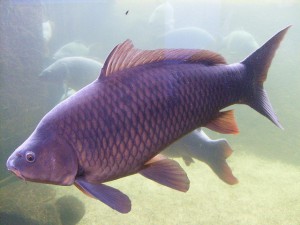Commonly used agricultural pesticides negatively affect common carp
Atrazine is one of the most widely used herbicides in the world, and chlorpyrifos is an organophosphate insecticide commonly applied to control crop pests in the United States. Both of these pesticides have been found to contaminate streams, rivers, and groundwater near agricultural lands. However, little is known on the effect that exposure to contaminated water may have on aquatic wildlife. A new study published in Ecotoxicology and Environmental Safety addresses this question by assessing the impact that exposure to atrazine, chlorpyrifos and the two insecticides combined have on common carp. In laboratory experiments, the fish were exposed to insecticides and then allowed to recover in clean water. After the recovery period, scientists assessed the amount of pesticide residue left in the kidneys of the fish, and looked for the production of proteins that are produced when fish are stressed by environmental exposures. They found that pesticide residues in the kidneys and the amount of stress proteins produced corresponded with the dose of pesticides the fish were exposed to. The quantity of residues found after the recovery period indicated that breakdown and removal of the chemicals in fish is a long-term process.



